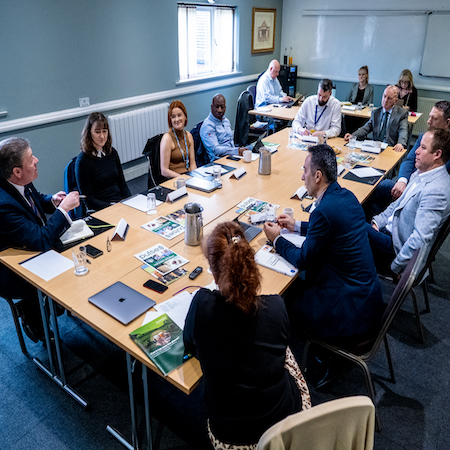Caterers, facility managers and sustainability managers working within the NHS in England came together at a Round Table event hosted by HEFMA and healthcare meals provider, apetito, to discuss two of the biggest challenges facing hospital catering services as they work towards a net zero future: single-use packaging and carbon in the menu.
During three hours of open and friendly debate, participants shared their thoughts, views and experiences of tackling these issues within their own Trusts. It soon became clear that whilst some were further on in their journeys than others, the prevailing view was that regardless of regulatory controls, taking a lead on removing single-use packaging wherever possible and introducing more sustainable food is something that the NHS, as an anchor institution, needs to do.
Key takeaways
• People - your staff and visitors - want these changes to happen. The public are on your side. So don’t put barriers in place that may not even exist.
• There are different drivers to these issues and pushing a net zero agenda may not be the right approach. For instance, health messaging and healthier life choices by reducing red meat consumption, or reducing the need to empty bins by taking single-use packaging away, may be far more effective. Identify the levers that will appeal within your premises.
• Encourage a culture that welcomes change. With staff in particular, make it their idea and appreciate their suggestions.
• Don’t over-complicate and don’t try to do too much at once. Little changes and small steps are the way forward. For instance, ‘meat-free Monday’ might be a step too far, whilst meat in moderation is more acceptable.
• Shout about the good work you are doing. Celebrate and share. Be more descriptive about dishes and the provenance of ingredients. Story-telling is very important.
• Plastic packaging is not the enemy. Packaging that is designed to be used once and thrown away is the problem.
• Making progress is easier than you think.
Don’t hold your breath
It would have been difficult to hold this discussion without some mention of the new Government Buying Standards for Food and Catering Services (GBSF), which are still awaited. Having been expected in 2022, there is now a feeling that these are unlikely to be released during this Parliament.
They are controversial, particularly over the issue of local sourcing, which Lee Sheppard, Director of Corporate Affairs, Policy and Sustainability at apetito UK, feels particularly strongly about (see the March/April issue of our Pulse magazine for more on this). One of the biggest points of contention is that the often discussed food miles are in fact a small part of the carbon footprint of what we eat and drink. Of far more importance is what we eat and when. One statistic shared with the group was that if a strawberry grower continued to cultivate strawberries out of season in a hothouse, the carbon footprint would be seven times greater than the in-season crop.
There is also a strong view that this needs to be tempered with reality – public sector organisations can, and should, influence where they are able to, and make informed choices to support British produce wherever possible, as well as seasonality, but it is never going to be possible for a hospital to procure everything it needs within an area defined by lines drawn on a map.
There will be more detail of this event in forthcoming issues of our Pulse magazine.











